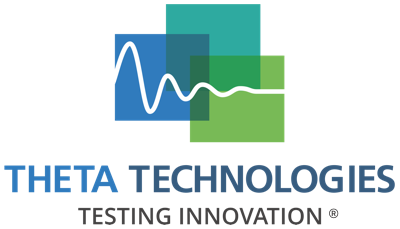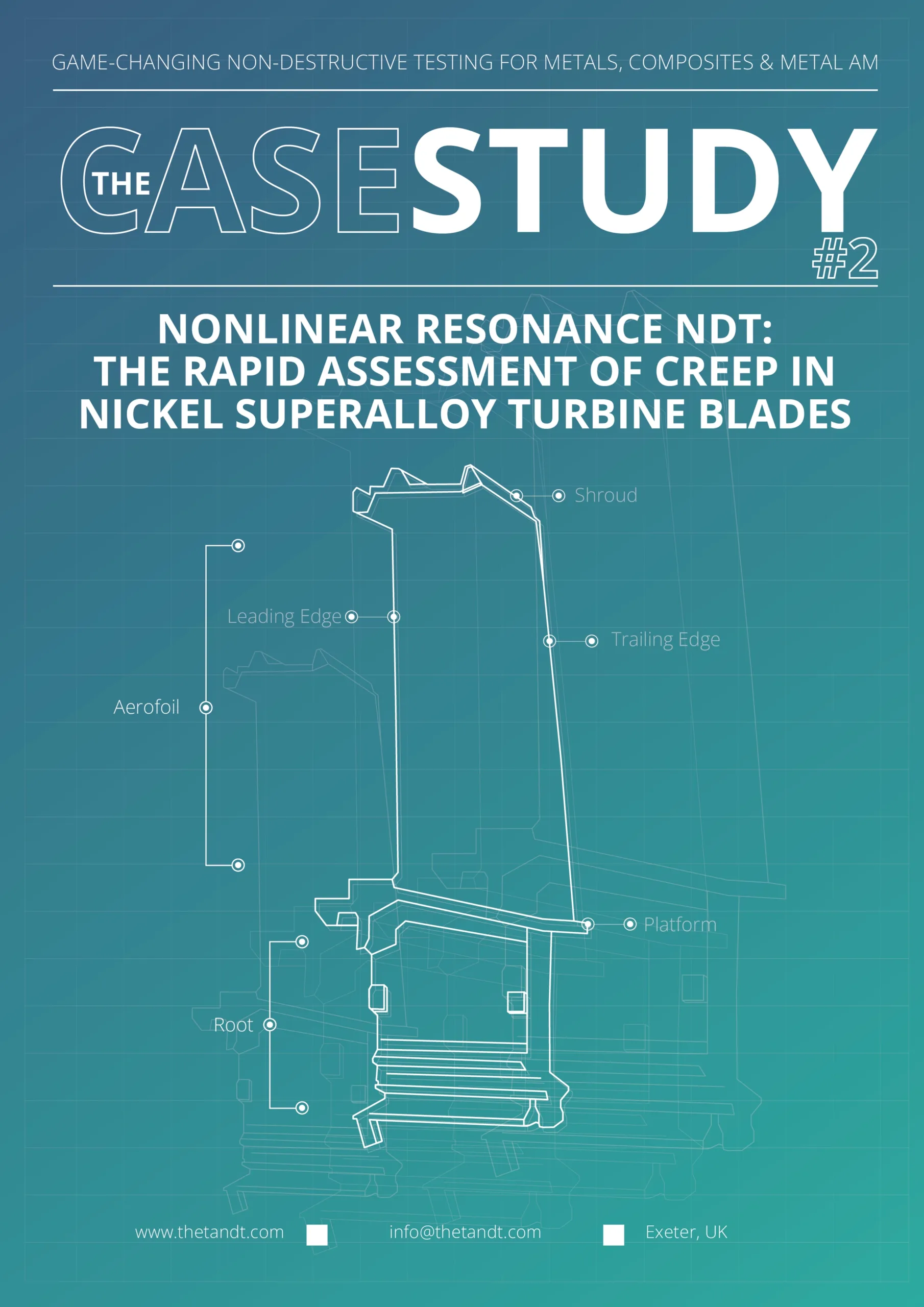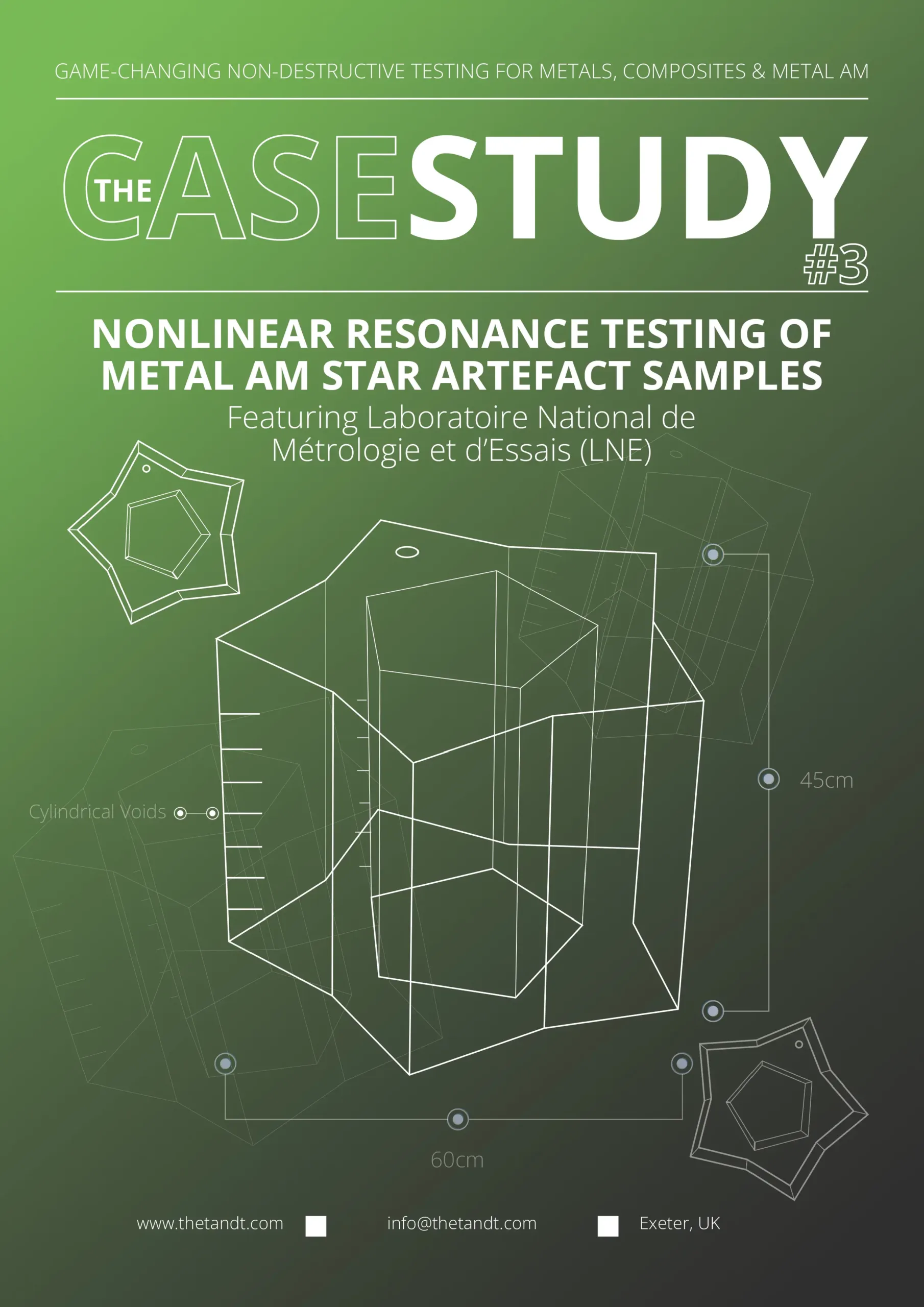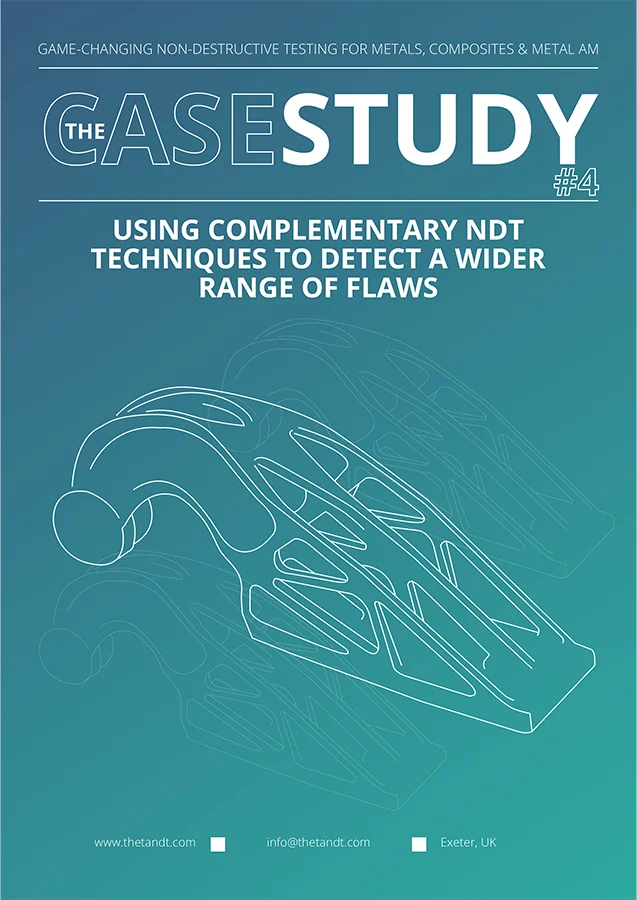The Case Study
Issue 5
Nonlinear Resonance NDT: Using complementary techniques to detect a wider range of flaws
We assess how this game-changing NDT solution can integrate into established non-destructive testing workflows to offer enhanced flaw detection capabilities for AM manufacturers.

Nonlinear resonance NDT: Identifying flaws in complex 3D printed metal parts
Delivering reliable non-destructive test results when others can’t.
Addressing the challenges of non-destructive testing in complex designs.
Metal additive manufacturing (AM), also known as 3D printing, has emerged as a transformative technology in the manufacturing industry. It offers unprecedented design freedom, enabling the production of complex geometries that were previously unattainable through conventional manufacturing processes. Despite the overwhelming benefits, metal AM possesses unique challenges for non-destructive testing (NDT) methods. These challenges have meant that many manufacturers have simply not been able to utilise the technology to its full potential.
Complex geometries and internal structures
One key advantage of metal AM is the ability to fabricate intricate designs and complex internal structures. While this offers exciting possibilities, it also presents significant difficulties in quality assurance. Traditional NDT techniques, such as Ultrasound or Dye Penetrant often rely on parts being solid and having smooth surfaces. In AM-produced components, however, the geometries are often irregular, convoluted, and possess internal channels and voids, making it challenging for conventional NDT methods to effectively probe those areas. Even X-ray CT, the current ‘gold standard’, struggles to produce acceptable images of larger, dense metal parts with fine internal detail.
Limited accessibility
Another inherent challenge is the limited accessibility of internal structures in increasingly complex AM geometries. Due to the layer-by-layer fabrication process, certain areas of the part are often inaccessible or require disassembly to perform effective NDT inspections; eradicating the non-destructive aspect. This is a considerable hurdle for those who need to assess the quality and integrity of hidden regions, consequently, the application of standard NDT techniques becomes impractical or infeasible.
Material variability and anisotropy
Metal AM processes introduce unique material characteristics that further complicate NDT practices. Variability in material properties such as, porosity, grain structure, and residual stresses can arise due to inherent process complexities. The anisotropic nature of the AM parts, resulting from directional solidification and layering effects, poses additional challenges for NDT. These factors can significantly affect the reliability and accuracy of NDT results as the established models and methodologies for conventional materials may not directly apply to AM-produced components.
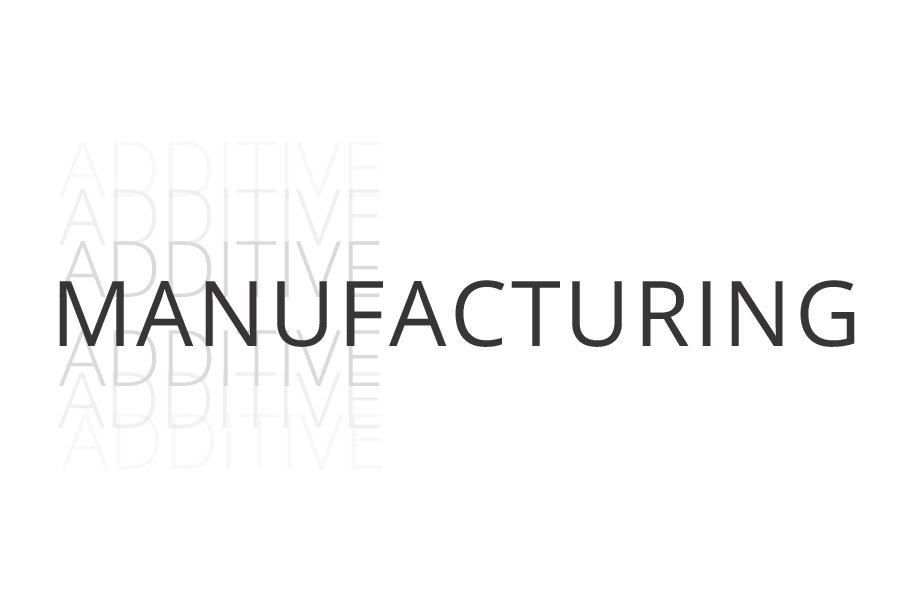
Next-level flaw detection: A game-changing non-destructive testing solution proven to detect the presence of flaws in complex AM metal parts.
If you’ve been looking to adopt metal additive manufacturing for end-user parts only to have that ambition thwarted by the lack of effective non-destructive testing for increasingly complex parts, then Theta Technologies’ revolutionary technique could almost certainly be the solution to your problems.
The unique nonlinear resonance technique developed by Theta Technologies is designed to excite components using a variety of different sources. Once the component is excited, a detector system watches for non-linearity within the component under test. With the metal additive manufacturing industry rapidly evolving, the lack of an effective non-destructive testing solution with the ability to cope with the plethora of design opportunities associated with 3D printing has caused frustration amongst designers and manufacturers alike. It is because of this that additive manufacturing has largely been adopted for prototyping rather than end-user parts. Enter Theta Technologies!
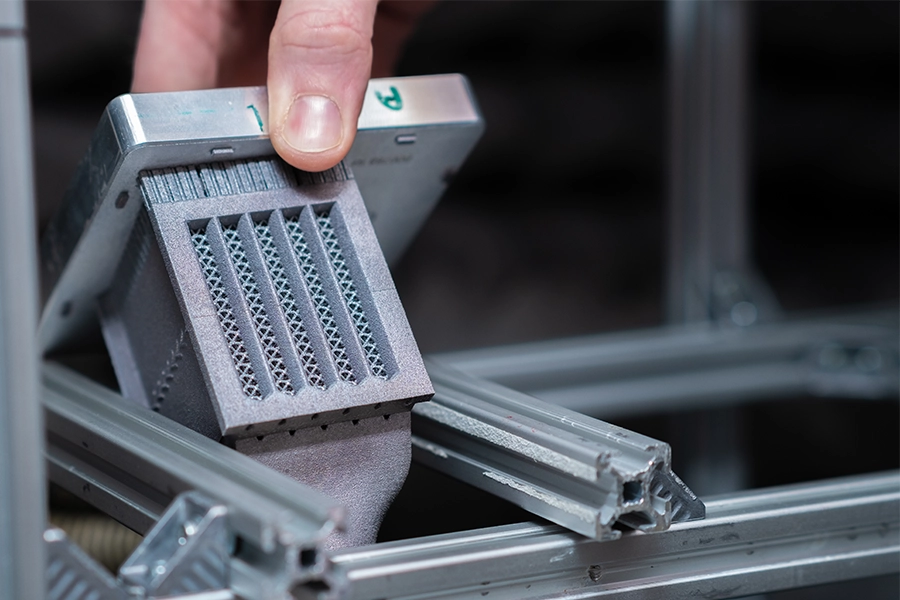
An additive manufactured heat exchanger featuring an array of complex geometries.
Theta’s solution offers a number of crucial benefits over other existing NDT options on the market…
Theta’s unique nonlinear resonance non-destructive testing technique could not be emerging at a better time for those wanting to additive manufacture bespoke metal parts; particularly for safety-critical applications. Theta’s solution offers a number of crucial benefits over other existing NDT options on the market such as saving time, reducing overall costs and freeing up resources by identifying flawed components before costly post-processing practices are undertaken.
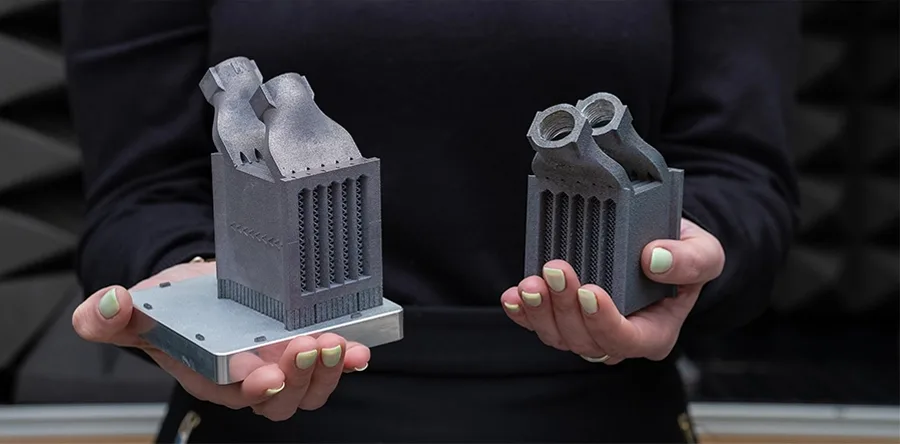
Theta Technologie’s nonlinear resonance NDT can test metal AM parts both on and off the build platform.
Case Study: The Proof
Validating the credentials of nonlinear resonance NDT.
There is, of course, no better way to prove that new technology does what it claims to than by putting it under intense scrutiny. That’s where components such as heat exchangers come in. The notoriously complex geometry of these parts has meant that existing non-destructive testing technologies have been far from effective at identifying flaws within the parts; so it was time for Theta Technologies to prove that they had the solution to an increasingly common additive manufacturing problem.
Theta Technologies’ nonlinear resonance non-destructive testing technology was used to assess two additive-manufactured heat exchanger samples as part of the study. Using nonlinear resonance to excite each component into resonance, Theta Technologies were able to exploit microscopic flaw behaviours to identify whether either of the samples showed signs of a flaw within their complex structures. By increasing the excitation of the parts, Theta Technologies are able to identify whether the part is flawed, as defective samples show an amplitude-dependent frequency response. In this case, a nonlinear signature could be an indicator of cracking.
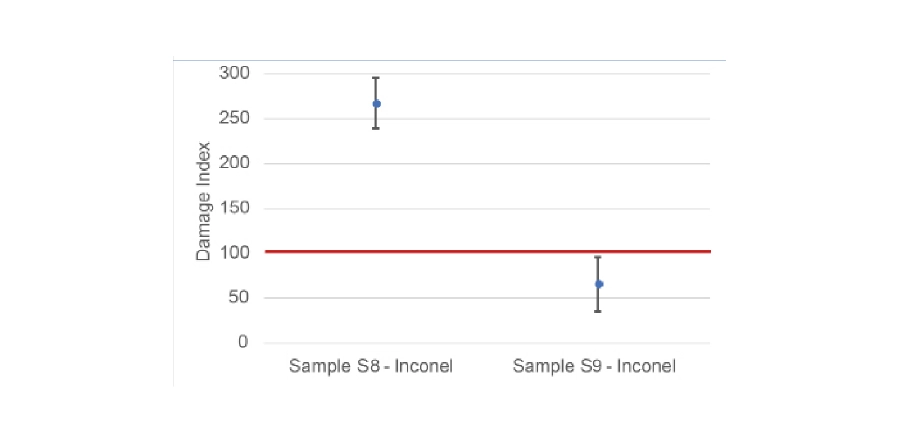
Clear distinctions are made between flawless and flawed samples.
Problem solved!
The manufacturers of the heat exchangers were already aware that one of the samples contained flaws and subsequently challenged Theta Technologies’ nonlinear resonance NDT technique to provide a successful identification of these known defects. The blind tests of each of the Inconel samples were undertaken using the same parameters, with repeatability and reproducibility of the part examinations a key feature in determining the overall outcome.
The graph above shows the ‘Damage Index’ for each of the samples subjected to the tests, S8 and S9. The error bars show two standard deviations obtained in multiple reproducibility tests. The results showed clear distinctions between the flawed and flawless component based on the nonlinear signature, thus proving Theta Technologies’ credentials in identifying flaws in complex additively manufactured components.
EXPLORE OUR DIGITAL LIBRARY
Issue #2
The Case Study
Nonlinear resonance NDT: The rapid assessment of creep in nickel superalloy turbine blades
learn more
Find out more about this revolutionary NDT technology from the team that built it.
Theta Technologies Limited

Address
Theta Technologies Limited
3 Babbage Way
Exeter Science Park
Clyst Honiton
Exeter
EX5 2FN
United Kingdom
Terms & Conditions Privacy & Cookie Policy Anti-Slavery Policy © Theta Technologies. 2023
